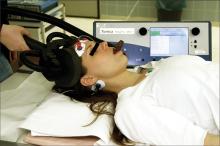AMSTERDAM – In one of the few clinical trials conducted to date, magnetic seizure therapy yielded outcomes similar to electroconvulsive therapy for the treatment of resistant depression but had the advantage of faster recovery, German investigators reported at the annual congress of the European College of Neuropsychopharmacology.
“For treatment-resistant depression, electroconvulsive therapy [ECT] is often the treatment of last resort. It has been applied for 75 years and is effective, but has cognitive side effects, relapse rates as high as 50%, and it carries a stigma,” said Dr. Sarah Kayser of the University Hospital of Bonn (Germany), who presented the findings.
Magnetic seizure therapy [MST], performed under general anesthesia, is a more focal form of convulsive therapy that uses a strong magnetic field to evoke a seizure. It provides greater control over sites of seizure onset and patterns of seizure spread, she said.
Preliminary studies on small groups of patients have suggested that MST is a successful antidepressant approach, with less potential for cognitive side effects, compared with ECT. Although the initial prototype machine was large and unwieldy with multiple components, the newer MagPro MST, which is made in Denmark, is much smaller and easier to work with, she noted.
The prospective study included 20 patients: 16 with a DSM-IV diagnosis of major depressive disorder and 4 with bipolar disorder. The average patient was a 50-year-old female who had had six lifetime episodes of illness, been treated with 18 medications, and been hospitalized four times. The average duration of the most recent episode of illness was 6 years in the MST group and 3.5 years in the ECT group. One out of five patients had attempted suicide.
Ten patients received ECT, and the other 10 received a full course (up to 12 treatments) of MST. The outcome measure of effectiveness was remission or a 50% reduction in depressive symptom severity according to the Hamilton Depression Rating Scale (HDRS28) and the Montgomery-?sberg Depression Rating Scale (MADRS).
The two treatment groups both demonstrated significant improvement over baseline. Response criteria were met by 65% of the patients, whereas 53% met the criteria for remission, Dr. Kayser reported. Mean scores on the HDRS28 declined by approximately 12 points in each treatment arm (P less than .001), and on the MADRS they dropped approximately 12 points after ECT and 15 points after MST (P less than .001).
Several aspects of recovery from the procedure were significantly better in the MST arm, compared with ECT, she reported. “Patients were quicker to breathe independently after anesthesia, and their reorientation time was faster, based on their answers to biographical questions such as name, date, and so forth,” she said.
Mean recovery time (defined as independent breathing) was nearly 4 minutes after ECT, compared with approximately 1.5 minutes with MST (P less than .01). Reorientation time was 8 minutes vs. 2 minutes (P less than .01). EEG showed no effects on brain structure with either approach.
Neither arm showed significant changes in cognitive outcomes, including learning and memory (verbal and visual), abstract knowledge, executive functions (verbal fluency) and speed of processing.
This is an emerging treatment for severe depression that is being studied in only four clinical trials that are centered in New York/Dallas; Australia; Bonn, Germany; and Berlin.
The authors had no relevant financial conflicts of interest.


